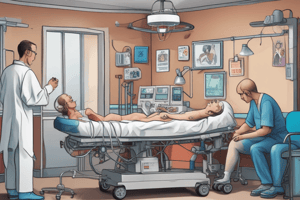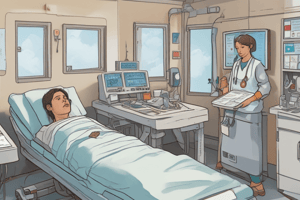Podcast
Questions and Answers
What is the primary focus of adolescent medicine?
What is the primary focus of adolescent medicine?
- Prenatal care
- Neonatal care
- Unique health needs of adolescents (correct)
- Pediatric surgical conditions
Which of the following is a common pediatric surgical condition?
Which of the following is a common pediatric surgical condition?
- Hernias (correct)
- Pneumonia
- Asthma
- Diabetes
What is a key concept in neonatology?
What is a key concept in neonatology?
- Vaccinations
- Pubertal development
- Newborn assessment and stabilization (correct)
- Menstrual disorders
Which surgical approach is used to minimize tissue damage and promote faster recovery?
Which surgical approach is used to minimize tissue damage and promote faster recovery?
What is a common health issue in adolescent medicine?
What is a common health issue in adolescent medicine?
What is a key concept in pediatric surgery?
What is a key concept in pediatric surgery?
What is a key aspect of pediatric emergency care?
What is a key aspect of pediatric emergency care?
What is a crucial element of pediatric development?
What is a crucial element of pediatric development?
What is a key consideration in pediatric surgery?
What is a key consideration in pediatric surgery?
What is a critical milestone in child development?
What is a critical milestone in child development?
In pediatric emergency care, what is a critical scenario to recognize and manage?
In pediatric emergency care, what is a critical scenario to recognize and manage?
At what stage of development do children typically begin to walk?
At what stage of development do children typically begin to walk?
Flashcards are hidden until you start studying
Study Notes
Pediatric Emergency Care
Overview
- Pediatric emergency care involves the assessment and management of acute illnesses and injuries in infants, children, and adolescents.
- Emergency care providers must consider the unique physical and emotional needs of pediatric patients.
Key Concepts
- Pediatric Advanced Life Support (PALS) guidelines for resuscitation and stabilization
- Recognition and management of pediatric emergencies, such as:
- Respiratory distress
- Cardiac arrest
- Trauma
- Infectious diseases (e.g., meningitis, sepsis)
- Poisoning and overdose
Child Development
Overview
- Child development encompasses physical, cognitive, and emotional growth from birth to adolescence.
- Understanding normal development helps identify deviances and inform interventions.
Key Concepts
- Stages of development:
- Infancy (0-1 year)
- Toddlerhood (1-3 years)
- Early childhood (4-6 years)
- Middle childhood (7-10 years)
- Late childhood (11-14 years)
- Developmental milestones:
- Gross motor skills (e.g., sitting, walking)
- Fine motor skills (e.g., grasping, drawing)
- Language and communication
- Social and emotional development
Pediatric Surgery
Overview
- Pediatric surgery involves surgical interventions for congenital and acquired conditions in children.
- Surgical care requires consideration of the child's age, size, and developmental stage.
Key Concepts
- Common pediatric surgical conditions:
- Congenital anomalies (e.g., cleft palate, club foot)
- Abdominal conditions (e.g., appendicitis, hernias)
- Orthopedic conditions (e.g., club foot, scoliosis)
- Neurosurgical conditions (e.g., hydrocephalus, spina bifida)
- Surgical approaches:
- Open surgery
- Minimally invasive surgery (e.g., laparoscopy, endoscopy)
Adolescent Medicine
Overview
- Adolescent medicine focuses on the unique health needs of adolescents (10-19 years old).
- Providers must address physical, emotional, and social changes during this period.
Key Concepts
- Pubertal development and growth
- Health promotion and disease prevention:
- Vaccinations
- Substance abuse counseling
- Mental health support
- Common adolescent health issues:
- Acne
- Menstrual disorders
- Mental health concerns (e.g., depression, anxiety)
Neonatology
Overview
- Neonatology involves the care of newborns, particularly those who are premature, ill, or require specialized care.
- Neonatal care requires a comprehensive understanding of perinatal physiology and pathology.
Key Concepts
- Newborn assessment and stabilization:
- Apgar score
- Initial resuscitation and stabilization
- Neonatal conditions:
- Premature birth (<37 weeks)
- Low birth weight (<2500g)
- Respiratory distress syndrome
- Infections (e.g., sepsis, meningitis)
Pediatric Emergency Care
- Involves assessment and management of acute illnesses and injuries in infants, children, and adolescents
- Requires consideration of unique physical and emotional needs of pediatric patients
- Pediatric Advanced Life Support (PALS) guidelines for resuscitation and stabilization
- Recognition and management of pediatric emergencies, including:
- Respiratory distress
- Cardiac arrest
- Trauma
- Infectious diseases (e.g., meningitis, sepsis)
- Poisoning and overdose
Child Development
- Encompasses physical, cognitive, and emotional growth from birth to adolescence
- Understanding normal development helps identify deviances and inform interventions
- Stages of development:
- Infancy (0-1 year)
- Toddlerhood (1-3 years)
- Early childhood (4-6 years)
- Middle childhood (7-10 years)
- Late childhood (11-14 years)
- Developmental milestones include:
- Gross motor skills (e.g., sitting, walking)
- Fine motor skills (e.g., grasping, drawing)
- Language and communication
- Social and emotional development
Pediatric Surgery
- Involves surgical interventions for congenital and acquired conditions in children
- Requires consideration of the child's age, size, and developmental stage
- Common pediatric surgical conditions:
- Congenital anomalies (e.g., cleft palate, club foot)
- Abdominal conditions (e.g., appendicitis, hernias)
- Orthopedic conditions (e.g., club foot, scoliosis)
- Neurosurgical conditions (e.g., hydrocephalus, spina bifida)
- Surgical approaches:
- Open surgery
- Minimally invasive surgery (e.g., laparoscopy, endoscopy)
Adolescent Medicine
- Focuses on unique health needs of adolescents (10-19 years old)
- Providers must address physical, emotional, and social changes during this period
- Pubertal development and growth
- Health promotion and disease prevention:
- Vaccinations
- Substance abuse counseling
- Mental health support
- Common adolescent health issues:
- Acne
- Menstrual disorders
- Mental health concerns (e.g., depression, anxiety)
Neonatology
- Involves care of newborns, particularly those who are premature, ill, or require specialized care
- Requires comprehensive understanding of perinatal physiology and pathology
- Newborn assessment and stabilization:
- Apgar score
- Initial resuscitation and stabilization
- Neonatal conditions:
- Premature birth
- Low birth weight
- Respiratory distress syndrome
- Neonatal infections
Studying That Suits You
Use AI to generate personalized quizzes and flashcards to suit your learning preferences.



